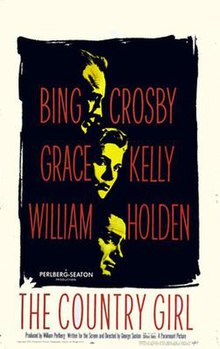The Country Girl (1954 film)
| The Country Girl | |
|---|---|
 original movie poster | |
| Directed by | George Seaton |
| Written by | George Seaton |
| Produced by | William Perlberg |
| Starring | Bing Crosby Grace Kelly William Holden |
| Cinematography | John F. Warren |
| Edited by | Ellsworth Hoagland |
| Music by | Score: Victor Young Songs: Harold Arlen (music) Ira Gershwin (lyrics) |
| Distributed by | Paramount Pictures |
Release dates | December 11, 1954 (NYC) December 15, 1954 (LA) May 17, 1955 (US) |
Running time | 104 minutes |
| Language | English |
The Country Girl is a 1954 drama film adapted by George Seaton from Clifford Odets' 1950 play of the same name, which tells the story of an alcoholic has-been actor struggling with the one last chance he's been given to resurrect his career. It stars Bing Crosby, Grace Kelly and William Holden. Seaton, who also directed, won the Academy Award for Best Writing, Adapted Screenplay. It was entered in the 1955 Cannes Film Festival.[1]
Kelly won the Oscar for Best Actress for the role, which previously had earned Uta Hagen her first Tony Award in the play's original Broadway production. The role, a non-glamorous departure for Kelly, was as the alcoholic actor's long-suffering wife.
The win was a huge surprise, as most critics and people in the press felt that Judy Garland would win for A Star Is Born. NBC even sent a camera crew to Garland's hospital room, where she was recuperating from the birth of her son, in order to conduct a live interview with her if she won. The win by Kelly instead famously prompted Groucho Marx to send Garland a telegram stating it was "the biggest robbery since Brinks."
Given the period of its production, the film is notable for its realistic, frank dialogue and honest treatments of the surreptitious side of alcoholism and post-divorce misogyny.
Some of the dialogue was used in a Mika song, "Grace Kelly".
Plot
In a theatre where auditions are being held for a new musical production, the director, Bernie Dodd, watches a number performed by fading star Frank Elgin and suggests he be cast. This is met with strong opposition from Cook, the show's producer.
Bernie insists on the down-on-his-luck Elgin, who is living in a modest apartment with his wife Georgie, a cold and bitter woman who has aged far beyond her years. They are grateful, though not entirely certain Elgin can handle the work.
Based on comments Elgin makes about her privately, Bernie assumes that Georgie is the reason for Frank's career decline. He strongly criticizes her, first behind her back and eventually to her face. What he doesn't know is that the real reason Elgin's career has ended is the death of their five-year-old son Johnny, who was hit by a car while in the care of his father.
Mealy-mouthed to the director's face, Elgin is actually a demanding alcoholic who is totally dependent on his wife. Bernie mistakenly blames her for everything that happens during rehearsals, including Elgin's requests for a dresser and a run-of-the-show contract. He believes Georgie to be suicidal and a drunk, when it is actually Frank who is both.
Humiliated when he learns the truth, Bernie realizes that behind his hatred of Georgie was a strong attraction to her. He kisses her and falls in love.
Elgin succeeds in the role on opening night. Afterward he demands respect from the producer that he and his wife had not been given previously. At a party to celebrate, Bernie believes that now that Elgin has recovered his self-respect and stature, Georgie will be free to leave him. But she stands by her husband instead.
Cast
- Bing Crosby as Frank Elgin
- Grace Kelly as Georgie Elgin
- William Holden as Bernie Dodd
- Anthony Ross as Philip Cook
- Gene Reynolds as Larry
- Jacqueline Fontaine as Lounge singer
- Eddie Ryder as Ed
- Robert Kent as Paul Unger
- John W. Reynolds as Henry Johnson
- Victor Young as Recording studio conductor
Awards and honors
The Country Girl won two Academy Awards.[2]
| Award | Result | Winner |
|---|---|---|
| Best Motion Picture | Nominated | William Perlberg Winner was Sam Spiegel – On the Waterfront |
| Best Director | Nominated | George Seaton Winner was Elia Kazan – On the Waterfront |
| Best Actor | Nominated | Bing Crosby Winner was Marlon Brando – On the Waterfront |
| Best Actress | Won | Grace Kelly |
| Best Writing, Screenplay | Won | George Seaton |
| Best Art Direction (Black-and-White) | Nominated | Hal Pereira, Roland Anderson, Samuel M. Comer, Grace Gregory Winner was Richard Day – On the Waterfront |
| Best Cinematography (Black-and-White) | Nominated | John F. Warren Winner was Boris Kaufman – On the Waterfront |
References
- Notes
- ^ "Festival de Cannes: The Country Girl". festival-cannes.com. Cannes Film Festival. Retrieved 2009-01-31.
- ^ "NY Times: The Country Girl". New York Times. Retrieved 2008-12-21.
External links
- The Country Girl at IMDb
- The Country Girl at AllMovie
- The Country Girl at the TCM Movie Database
- The Country Girl at the Internet Broadway Database
- 1954 films
- American drama films
- Films based on plays
- Films featuring a Best Actress Academy Award winning performance
- Films featuring a Best Drama Actress Golden Globe winning performance
- Plays by Clifford Odets
- Paramount Pictures films
- Films whose writer won the Best Adapted Screenplay Academy Award
- Films directed by George Seaton
- 1950s drama films
- Films about alcoholism
